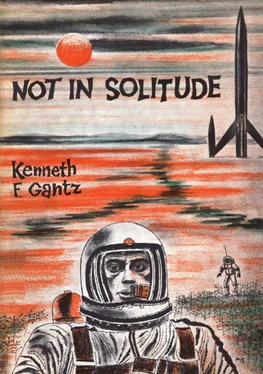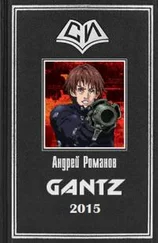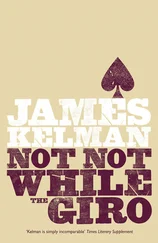Wertz reached for a pipette and drew up a few minims of the straw-colored isomer from the test tube and introduced it into a glass tube that stemmed through the shell of the bell jar. The liquid ran slowly down until a drop formed on the inside end of the tube directly over his tiny pile of fertilizer dotting the filter paper.
While the little spheroid swelled heavy and pendant on its glass stem, Wertz watched Cruzate. He was characteristically intense. This he won’t like, Wertz thought. It’s going to upset his allegiance to a one-way passage between the living and the dead.
The surface tension of the drop could no longer sustain its weight. Grossly large by any standard imposed by Earth gravity, it drew down an obese, pyramidal umbilical stalk, ruptured it, and fell upon the waiting powder. Immediately, as if spark had fallen on gunpowder, the reaction exploded into a cluster of dwarf Mars lichens, a bush-like bunch as large as a grapefruit.
“ Mon dieu! ” Cruzate breathed. “ C’est incroyable! ”
Wertz said, “Maybe. But there it is. Explosive generation of the whole plant. Bypassing the entire process of cellular growth. You still think they are what you call normal plants or what you call living organisms producible only by parent living organisms?”
Cruzate lifted the bell jar and fingered the lichens. “I will examine this.” He broke off a sprig, murmuring, “It is the perfect replica. I see lichen thallus. I feel it, but I must at once make microscopic sections. We shall see if it really lives. It cannot grow and reproduce its kind, unless somehow your liquid was alive. Maybe in it virus-like sub-microscopic organisms.”
Wertz said, “Don’t try to go down that street. There was nothing under that bell jar but what you or anyone else would call purely non-vital substances. But if you don’t think that plant you see is alive, look at this.”
He thrust the tip of a spatula into the container of hydrous ferric oxide and lifted a small quantity into a test tube, then added a like amount of silica. He put a little water into the tube and shook up the mixture, thumb over the mouth of the tube. “Lichen fertilizer suspended in water,” he said, displaying the murky liquid. “I’ll pour a little of this around the plants, and I’ll bet you say you can see them grow—rather see them expand by the instant addition of new branches and new stems.”
He tilted the tube carefully and poured a few drops at the base of the miniature Mars lichens. The cluster of plants snapped to triple its size so quickly that it spilled the tube out of his fingertips. Instantly the things crackled into being all over the end of the bench. Now they were the size of the plants out on the Mars plains. Wertz jumped back. He swore mildly. “It got away from me, but it’s damn convincing, isn’t it?”
“It is unholy!” Cruzate exclaimed. “If it is true, it is not good. I would rather not believe it. I must test it for life. Now. With no more the delay!”
Wertz said, “Test away all you want. I have already made sections, naturally. But maybe you can see something I didn’t. For anybody’s money, that stuff’s what you call alive, and get this, it’s indisputable that it came from non-living substances.”
“Virus, subvirus, whatever it is, it had to be in the solution. There is no other explanation.”
Wertz suppressed his exasperation. “Now you’re merely expressing a faith. In a preconceived idea. It has to be there, you say. Nothing has to be anywhere, until we establish that it is there. ‘Has to be’ is optative and absolute. Frankly I have very little patience with optatives, and in the universe of physical events I have none. There they are intruders and the cause for most of our blunders.”
“Maybe so,” Cruzate muttered. “But you, do you not really say by these same words that I ought not to accept optatives? That itself is an optative!”
“Medieval. Any good apprentice logician would be able to demolish that. While you look through your microscope and do…”
Cruzate’s eyes were bulging.
Wertz followed his outstretched arm and pointing finger.
The entire top of the bench was crowned by lichen plants. Instruments and glassware tumbled crazily among them. “It must be feeding on the silica in the glass!” he exclaimed.
A sharp cracking snapped like the ultra-rapid staccato of a dozen firecrackers. The embedded bell jar vanished in a swipe of transmuted color. Gray-green arms struck out at them.
And then Wertz was fighting. Shoulder-high, all over the laboratory, protruding from the benches and the shelves, from every point of security, the lichens had exploded into a jungle profusion. Except for the small air space in the geometric center of the room, they were drowning inside a great stinking puff ball. Walls, floor, ceiling, all familiar shape of the room had gone.
“Cruzate!” Wertz shouted. “Watch out for the acids. The tips are loaded with it. Cover your face and eyes. We’ve got to get out of here.”
It was thickly clinging. Yet it yielded, like a seaweedy maze. Wertz covered his face with one arm, and plunged at the door, like a fullback hitting the line.
“Come on, Cruzate!” He fumbled for the latch against the tingle of chemical activity on his bare face, at the same time noting methodically the mildness of the action and reflecting on the high selectivity of the plant’s acids for the substances the organism had affinity for. Instantly dissolve glass but only gently irritate the epidermis.
He burst out, reached behind, and jerked Cruzate through with a heavy pull. “Christ!” He slammed the door behind them.
“Some of that stuff got out!” He pointed to the lichen bits and severed strands at the sill. “Look! We’ve got to get it. If it starts to spread out here, we’re done for.”
Cruzate stooped, grubbing for the particles. “In the next lab we burn it. Or the acid.”
“No! Leave it there. We don’t dare lose a crumb. It could explode all over the ship.”
“It cannot eat of this metal,” Cruzate protested. He stamped the timageel deck.
“We don’t know what it can do. It ate into Houck’s suit and killed him. Maybe timageel will resist the acids. Maybe it won’t. Maybe the things might mutate under the conditions inside the spacecraft. You saw them hang on the walls and ceiling inside the lab. It had to find something it could corrode well enough to hold it. Probably the insulating panels. Maybe something else. We can’t take a chance.”
He yelled for help, shoving words of explanation at the dancing Cruzate between shouts.
A much-surprised airman eventually showed and wanted to know what the noise was all about.
“A blowtorch,” Wertz told him. In the geological lab next door was Dr. Judah’s blowtorch. On the tool bench.
The man gave him a hard look.
“I can’t move from here, dammit!” Wertz told him. “Neither can he. We’ve got lichen tips on us. Now get me that torch quick, and I’ll explain it to you later all you want. We’ll have to burn up our clothes too. Right here.”
The stare turned blank.
“Move, man!” Wertz slashed at him. “Then we’ll put on a good show for you.”
The airman shook his head, but he did turn around and go into Judah’s laboratory and he came back with the blow-torch. Wertz told him to set it on the floor and stay away from them.
“You got a match?” Wertz demanded. When the man had found a package in his pocket, he tried to remember how to light the torch.
The airman moved in. “Let me.”
“Get the hell back away from this stuff,” Wertz said. “You tell me. One step at a time.”
Between them they got it lighted. Wertz picked it up and poured the blue flame over the lichen fragments, carbonizing them, all that he could find.
Читать дальше












